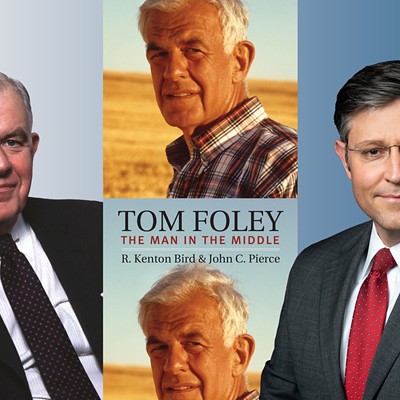A few more thoughts about that Ferris High School “debate.” Last month, the Spokesman- Review reported on the questions asked of Spokane political and school board candidates in the October debate. The debate was billed as student-run, so participants and observers had every reason to assume that the “hosts” — the students supplying the questions — had written them. Turns out this wasn’t the case. In fact, the questions were written by adults with ties to the Republican Party; the students only “selected” the questions.
Jennifer Walther, the Ferris English teacher who produced the event, doesn’t dispute Spokesman- Review reports that almost all of the questions were written by her Republican “friends” (supporters of David Condon); she defends her format and charges that the Review is maligning the “kids.” (Actually, the criticism has been aimed directly at her.)
Devoted fans are rallying to Walther. Some praise her and Ferris for putting on the “debate” — politically tainted questions notwithstanding. One wrote: “If Democrats wanted to play ball, they could have organized their own debate with their own questions.” (Honest, that’s a quote.)
Likely the district will slap a few knuckles and reassert its policy proscribing political biases, a bureaucratic placebo that likely will kill off future student-run debates. Alas, it’ll be a “baby out with the bathwater” solution.
Liberals want a “fair and balanced” test; however, I remind them that religious conservatives assert “fair and balanced” means science teachers should teach creationism along with Darwin. So why not teach “creationism” in science classes? Because creationism rests on faith and piety, not science — end of story. Fair and balanced has nothing to do with it. Likewise, partisan politics is off limits because it is about winning elections, not about inquiry, criticism, nor greater understanding.
I, for one, don’t fault Walther for consulting conservatives without consulting liberals; she invites my criticism because the particular conservatives she consulted were all partisan activists.
Too much “fair and balanced” can suck the intellectual energy out of the classroom. One of our son’s favorite teachers at Gonzaga Prep was his very conservative religious studies teacher with whom he seldom agreed. She certainly wasn’t “balanced.” She reveled in polemics, in argumentation — she also, however, encouraged her students to take her on; ever promoting intellectual exchange, she pushed and prodded, and our son thrived. I call that education.
So forget “fair and balanced,” and instead encourage Walther to widen her circle and next time — if there is a next time — to seek out conservatives whose ideas range beyond predictable partisan politics. And, yes, possibly she might — egads! — even involve a person or two with whom she disagrees. I have two problems with what Walther did.
First, she didn’t insist that her students critique the questions (not so you would notice anyway), and second… well, I’ll get to that shortly.
About the questions: The S-R published the list of questions asked during the School Board part of the debate. Goodness, if you wanted to illustrate what to avoid when framing a question, you couldn’t do better than to read through the verbal mess Walther’s partisan friends provided. We see here loaded questions, leading questions, compound leading questions and gobs of unnamed “studies” and “critics” mixed throughout.
Loaded questions imply assumptions contained within the question, e.g. “Studies show that so-called green schools are not as efficient or cost-effective… should we be spending substantially more of taxpayer’s money to build them?” The assumption that green schools are “not as efficient or cost-effective” (supported by one of those unnamed “studies”) implies that we should be spending less, which, of course, is the conclusion the question is designed to prompt. That’s a loaded question.
Another question, both loaded and leading, implies that unions are responsible for a fall-off in teacher effectiveness (not proved) and the everhigher cost of education (not proved). Or consider:
Despite a reduction in student enrollment, school districts are spending more money “than ever” (no source given). And then comes, in the same question, the grabber: “If the money isn’t going to the students, where is it going?” (Oh, I dunno, maybe the teachers are blowing it at the casino.)
More citing of unnamed authority: “School administrators have asserted…” (which school administrators?); “Studies show…” (what studies?); “Critics say…” (which critics?); “Some people think…” (oh, and who might they be?).
Students would have learned from a group exercise: “Class, what’s wrong with these questions?”
Which brings me to my second, and most serious, concern: This lack of transparency hid what amounts to plagiarism.
Webster defines plagiarism: “to take and pass off as one’s own the ideas, writing, etc. of another.” That’s a pretty simple definition. Walther didn’t just condone plagiarism, she promoted it.
Surely after 20 years in the classroom, she realizes that in the teaching profession, plagiarism is a capital offense. And in response to her actions, “some critics” now demand that her contract not be renewed next year.
Well, this isn’t going to happen. And why? For an answer, I direct your attention to question No. 15 on the School Board debate list of questions: “Who benefits most from teachers’ unions… the students or the teachers?” In this instance it’s the teacher who benefits the most. Why? Because an unreasonable principal, worried about public reaction — or that students are learning the wrong lessons in her classroom — can’t unilaterally terminate Walther. How so? Ironically, because of all those job protection policies on the books, courtesy of the very union she had her students beat up.























